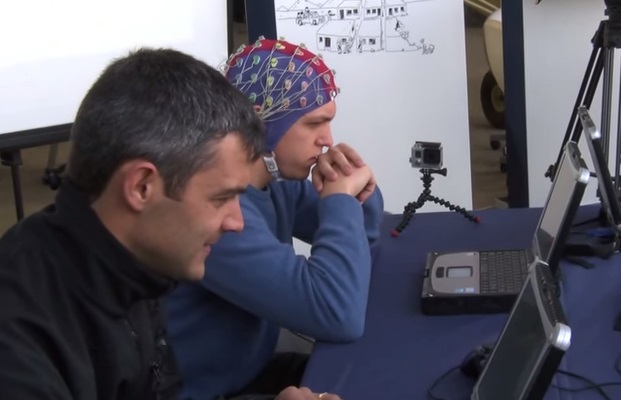A mind-controlled drone project called ‘Brainflight’ has been revealed in Portugal, hinting at how hands free interfaces could work in the future.
The company behind the development, Tekever, said the technology could in the short term be used to enable people with restricted movement to control aircraft.
Longer term the firm said piloting of larger jets, such as cargo planes, could be controlled in this way without the need for a crew on board.
However, one aviation expert told the BBC he thought the industry would be unlikely to adopt such technology due to a perception of being potentially unsafe.
Drone specialist Tekever, which works with security firms, police forces and the military, adapted existing Electroencephalography (EEG) technology so it could issue instructions to the software used to give the unmanned drone instructions.
How it works
Tekever fitted a special cap to a pilot to measure his brain activity, letting him steer a drone through a mission in the sky using his thoughts alone.
The company’s eventual target for the drone technology is applying it to pilots flying private and commercial aircraft using their minds alone, but it acknowledges there is a lot of work ahead.
In the test demonstration, pilot Nuno Lourenço focused entirely on simple thoughts within set formats, which he learned during extensive training.
This means the drone received clear signals, from his brain waves, that it could process quickly.
“This is an amazing, high-risk and high-payoff project,” Tekever chief operating officer Ricardo Mendes said at the launch.
The project needs extensive further technology development, he explained, but added that it “represents the beginning of a tremendous step change in the aviation field, empowering pilots and de-risking missions”.
Key benefits include allowing pilots to focus on the many advanced in-air processes while more simply controlling an aircraft, which the company describes as being akin to how professional sportspeople need to focus on tactical aspects of movement without worrying about maintaining basic game skills.
The news follows last year’s scientific breakthrough when Leslie Baugh, a double amputee, became the first person to operate two robotic arms with just his mind.
Like the thought-controlling drone pilots, Baugh had to train his mind to properly operate the technology. Instead of wearing a cap that measured his brain activity, however, Baugh underwent a much more intensive nerve surgery.
Watch the video demonstration courtesy of BBC news below:
